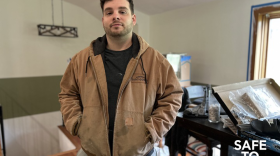New state limits are now in effect for PFAS chemicals in public drinking water supplies. The now-common industrial contaminants have been linked to health risks.
New Hampshire's new standards are the nation’s strictest, and largely the first of their kind.
They require local water utilities to test for four types of PFAS chemicals every quarter.
If they find a PFAS level over the next year that’s above the state's new, low limits, these utilities will have to switch to a different water source – or develop costly treatment systems.
Clark Freise is the assistant commissioner of the state Department of Environmental Services. He says some larger systems may just be able to shut off their contaminated wells and switch to other water sources.
"Where we're very concerned is the small water systems that service 500 or fewer people, because many of them are single source,” Freise says.
His department got $6 million in the new state budget to aid small systems in complying with the new law during this first year.
The first thing they and all affected water systems will have to do is test for PFAS, if they haven’t been doing so already. Freise says each well test can cost a few hundred dollars.
"And especially for a small water system where you may only have 20 customers or 30 customers, that's a significant impact,” he says.
As part of that budget allocation, he says the state may let towns buy into a bulk sampling contract to save money on testing.
But some local officials still argue the rules are an unconstitutional unfunded mandate. Some towns are considering filing suit or refusing to comply without more state funding.
Freise says his agency and the state municipal association are looking for other sources of funding – from existing state money, the federal government, or in next year’s legislative session – to help.
The bigger costs of the new rules will come after this first year of testing, when systems that are out of compliance may have to install costly new treatment systems or decommission wells.
Freise estimates that 7 to 9 percent of all wells in the state – public or private – contain levels of PFAS above the state's new limits.
Private wells are not subject to these or any state regulations. But officials hope the change will encourage homeowners to do their own testing.








